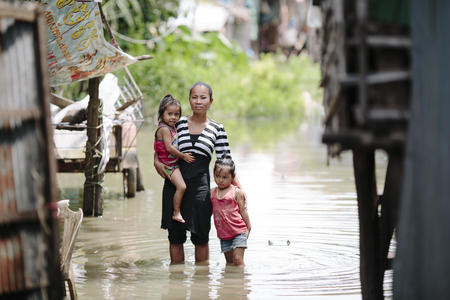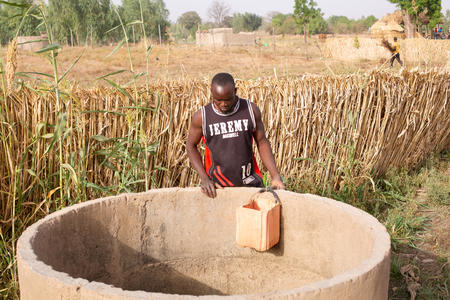Adaptation and resilience: why the climate crisis is a water crisis

Access to clean water is vital to climate change resilience. As WaterAid's work in south-eastern Burkina Faso shows, developing robust and reliable water, sanitation and hygiene systems is our best defence against climate uncertainty.
The climate crisis is often discussed in terms of carbon emissions, but people largely feel the impacts of a changing climate through water. It is estimated that, in the past decade, more than 90% of major disasters have been caused by floods, storms, heatwaves, droughts and other weather-related events. And these disasters are expected to become more frequent and more intense because of climate change.
The communities where WaterAid works are on the frontline of a changing climate, and we are already seeing household water supplies under increased threat. The countries most vulnerable to climate change have done the least to contribute to it, yet they carry the greatest burden.
But it is almost too late to talk about mitigation. We must move the conversation on to climate adaptation – and put water at the heart of it. The scale and interconnected nature of universal access to water, sanitation and hygiene (WASH) and climate change means that these issues cannot be dealt with alone. The private sector, water utility companies (including those in the UK), governments and NGOs must all work together in a coordinated and collective way.
However, the levels of global climate finance directed to the WASH sector are low. Globally, the water sector receives less than 10% of climate funding from public sources. In 2018, $6.4bn was allocated for water and wastewater management, and $774m for basic WASH. What’s more, our recent report, ‘Just add water: a landscape analysis of climate finance for water’, shows that vulnerable communities, who have little carbon emissions to speak of, are in vital need of climate support. Yet out of all global climate finance, only 5% is currently allocated for adapting to climate change – roughly $30 billion per year.
Building resilient water, sanitation and hygiene services
Access to clean water is vital to climate change resilience, but even the most climate-vulnerable countries have some of the lowest levels of clean water access in the world. Around 80% of Bangladesh, for example, is prone to flooding, regularly leaving crops in ruin and people at risk from waterborne diseases. But according to the latest WHO/UNICEF JMP figures, just 57.5% of Bangladesh’s population have access to a safely-managed drinking water supply at home.
Resilient water services with reliable supplies can transform the prospects of communities living in poverty. Water is more likely to be available in times of scarcity, enabling communities to withstand longer dry seasons and flooding. And the combined benefits of an improved safe water supply, decent sanitation and hygiene can boost living standards and reduce exposure to waterborne diseases, helping communities to better cope with the effects of climate change.
But adapting to climate change also means ensuring that local communities have the skills to monitor, maintain and fix WASH facilities, and securing enough financing to support these localised responses.
An urgent need for sustainable and safely managed services
At a recent webinar focused on the latest developments in climate adaptation and resilience in the water sector, Lucien Damiba, WaterAid’s Regional Research and Knowledge Manager, spoke about the challenges experienced by people in Burkina Faso, and what they're doing to try to become more resilient.
In the last two months of the dry season in Boulgou Province in south-eastern Burkina Faso, people struggle to find enough water to drink, cook, keep clean and ensure their animals survive. Many rivers dry up, meaning that the only water source is the local pump. But if too many people rely on this one pump, the underground water level can drop, meaning the pump has to work harder and breaks more often. The water may even run out.
To tackle this, Lucien explained how WaterAid works with communities to design practical, affordable and long-lasting ways to ensure people have access to clean water, all year round. “We train community volunteers to monitor how much water is in their area, from measuring rainfall, to tracking the level of water in wells and boreholes,” he said.
Watch the webinar on water adaptation and resilience
Ensuring everyone’s access to sustainable water facilities also helps to re-balance some of the inequalities revealed by the COVID-19 pandemic, especially in hospitals, clinics and schools.
As our changing climate makes the future all the more uncertain, we are also working towards identifying and monitoring water stress so that adaptation strategies can be tailored to each location.
And while helping communities become water experts has been successful in Boulgou, Lucien highlighted the need for more rapid innovation. Our best defence against the effects of climate change that cause water uncertainty is to use robust systems, and to work with local communities to ensure they have the tools and training to maintain them.
2021: a year of hope
2021 is the year we must make change happen. It is the year in which the world will make big decisions on how to recover from a global health crisis – a once-in-a-generation opportunity to create a greener and fairer society, and a world that is better prepared for the effects of our changing climate.
With the support of WASH professionals, we can use our experience and expertise in climate adaptation to deliver reliable water facilities to people in low-income countries, and collectively drive forward our action for crises-resilient water, sanitation and hygiene.
Rob Fuller is WaterAid's Global Water Sector Advisor.
Join the discussion
In the months ahead of COP26, the UK water sector is coming together to host a series of free online discussions, using the themes from the five COP26 campaigns. The virtual Water Climate Discussion series will continue throughout 2021 with:
- Clean transport: 5 August, 9-10am BST
- Finance: 2 September, 9-10am BST
- Water Climate Discussion Conference: 7 October, 9-5pm GMT
- Live from COP26: November, date and time TBC
Further reading
Who is picking up the bill for climate crisis inertia?
Living in a fragile world: the impact of climate change on the sanitation crisis
Top image: Women walk on cracked ground on their way to a pond to collect water at Vitaranga, Khulna, Bangladesh, March 2018.





